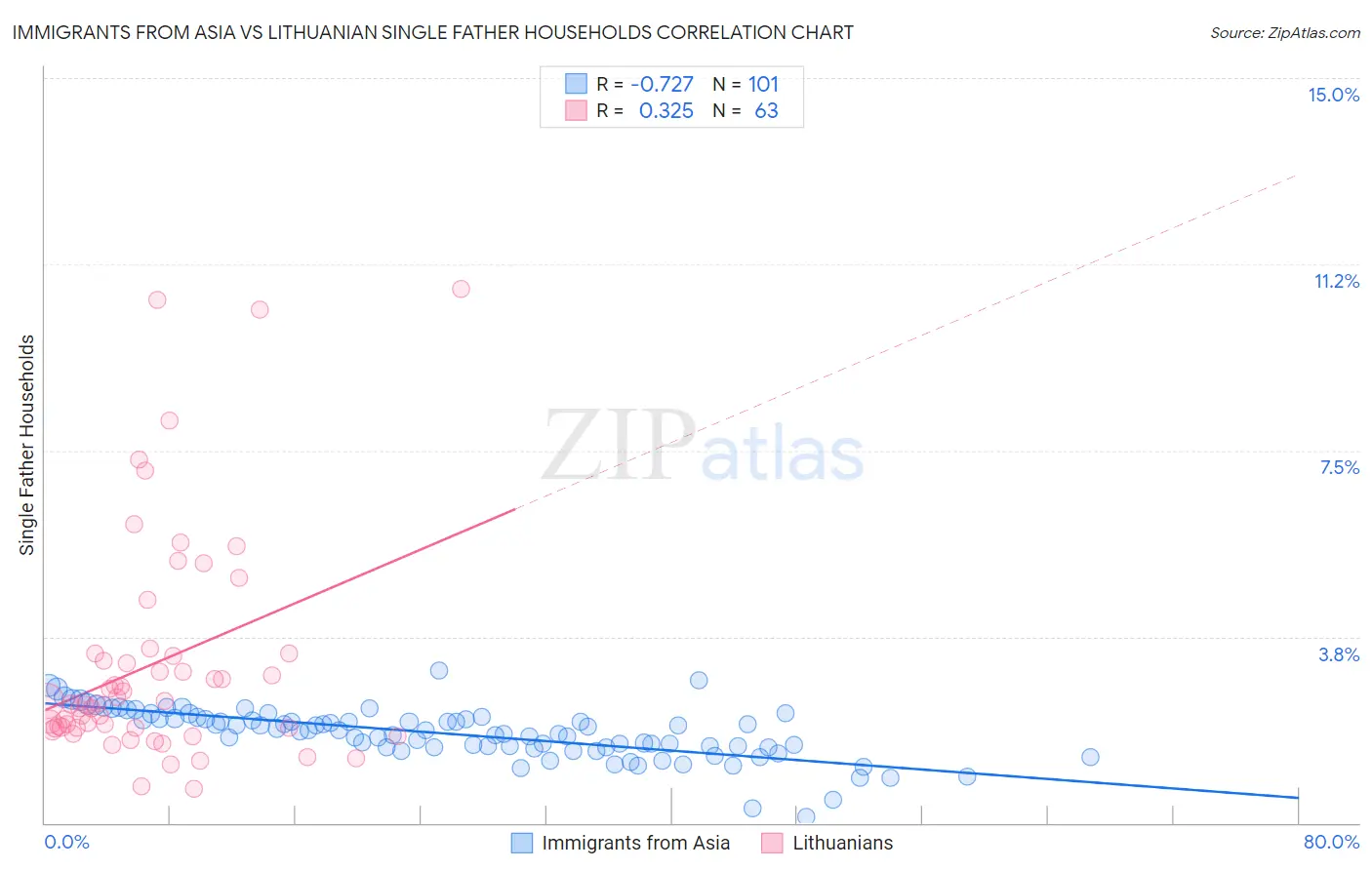Immigrants from Asia vs Lithuanian Single Father Households
COMPARE
Immigrants from Asia
Lithuanian
Single Father Households
Single Father Households Comparison
Immigrants from Asia
Lithuanians
2.1%
SINGLE FATHER HOUSEHOLDS
99.7/ 100
METRIC RATING
79th/ 347
METRIC RANK
2.1%
SINGLE FATHER HOUSEHOLDS
99.5/ 100
METRIC RATING
87th/ 347
METRIC RANK
Immigrants from Asia vs Lithuanian Single Father Households Correlation Chart
The statistical analysis conducted on geographies consisting of 538,286,555 people shows a strong negative correlation between the proportion of Immigrants from Asia and percentage of single father households in the United States with a correlation coefficient (R) of -0.727 and weighted average of 2.1%. Similarly, the statistical analysis conducted on geographies consisting of 416,616,302 people shows a mild positive correlation between the proportion of Lithuanians and percentage of single father households in the United States with a correlation coefficient (R) of 0.325 and weighted average of 2.1%, a difference of 1.2%.

Single Father Households Correlation Summary
| Measurement | Immigrants from Asia | Lithuanian |
| Minimum | 0.13% | 0.69% |
| Maximum | 3.1% | 10.7% |
| Range | 2.9% | 10.0% |
| Mean | 1.8% | 3.2% |
| Median | 1.9% | 2.4% |
| Interquartile 25% (IQ1) | 1.5% | 1.9% |
| Interquartile 75% (IQ3) | 2.1% | 3.4% |
| Interquartile Range (IQR) | 0.59% | 1.5% |
| Standard Deviation (Sample) | 0.51% | 2.3% |
| Standard Deviation (Population) | 0.51% | 2.3% |
Demographics Similar to Immigrants from Asia and Lithuanians by Single Father Households
In terms of single father households, the demographic groups most similar to Immigrants from Asia are Immigrants from South Africa (2.1%, a difference of 0.090%), Estonian (2.1%, a difference of 0.11%), Armenian (2.1%, a difference of 0.17%), New Zealander (2.1%, a difference of 0.22%), and Greek (2.1%, a difference of 0.23%). Similarly, the demographic groups most similar to Lithuanians are Bhutanese (2.1%, a difference of 0.13%), Immigrants from Armenia (2.1%, a difference of 0.18%), Immigrants from Pakistan (2.1%, a difference of 0.19%), Immigrants from Guyana (2.1%, a difference of 0.43%), and Asian (2.1%, a difference of 0.51%).
| Demographics | Rating | Rank | Single Father Households |
| Immigrants | Bangladesh | 99.8 /100 | #73 | Exceptional 2.1% |
| Immigrants | Egypt | 99.8 /100 | #74 | Exceptional 2.1% |
| Immigrants | Sweden | 99.8 /100 | #75 | Exceptional 2.1% |
| Immigrants | Scotland | 99.8 /100 | #76 | Exceptional 2.1% |
| Immigrants | Saudi Arabia | 99.8 /100 | #77 | Exceptional 2.1% |
| Estonians | 99.7 /100 | #78 | Exceptional 2.1% |
| Immigrants | Asia | 99.7 /100 | #79 | Exceptional 2.1% |
| Immigrants | South Africa | 99.7 /100 | #80 | Exceptional 2.1% |
| Armenians | 99.7 /100 | #81 | Exceptional 2.1% |
| New Zealanders | 99.7 /100 | #82 | Exceptional 2.1% |
| Greeks | 99.7 /100 | #83 | Exceptional 2.1% |
| Carpatho Rusyns | 99.6 /100 | #84 | Exceptional 2.1% |
| Immigrants | Hungary | 99.6 /100 | #85 | Exceptional 2.1% |
| Asians | 99.6 /100 | #86 | Exceptional 2.1% |
| Lithuanians | 99.5 /100 | #87 | Exceptional 2.1% |
| Bhutanese | 99.5 /100 | #88 | Exceptional 2.1% |
| Immigrants | Armenia | 99.5 /100 | #89 | Exceptional 2.1% |
| Immigrants | Pakistan | 99.5 /100 | #90 | Exceptional 2.1% |
| Immigrants | Guyana | 99.4 /100 | #91 | Exceptional 2.1% |
| Romanians | 99.4 /100 | #92 | Exceptional 2.1% |
| Croatians | 99.3 /100 | #93 | Exceptional 2.1% |